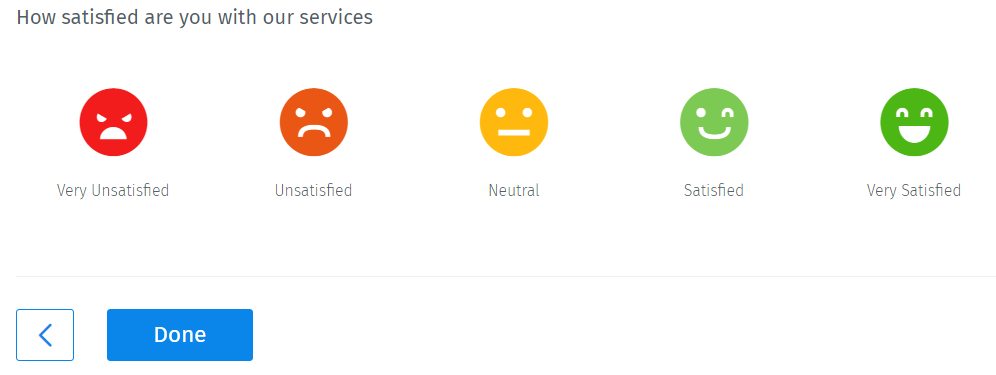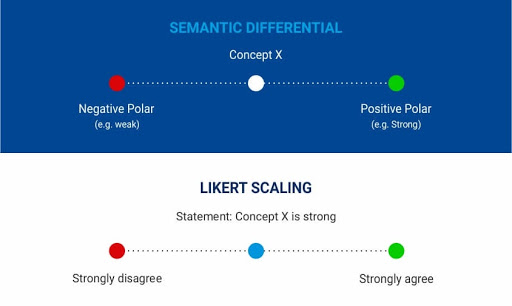What is the semantic differential scale?
A semantic differential scale is a survey or questionnaire rating scale that asks people to rate a product, company, brand, or any 'entity' within the frames of a multi-point rating option. These survey answering options are grammatically on opposite adjectives at each end. For example, love-hate, satisfied-unsatisfied, and likely to return-unlikely to return with intermediate options in between.
Surveys or questionnaires using the semantic differential question
is the most reliable way to get information on people’s emotional attitude towards a topic of interest.
Charles Egerton Osgood, a famous American psychologist, invented the semantic differential scale so that this 'connotative meaning' of emotional attitude towards entities can be recorded and put to good use.
Osgood conducted this research on an extensive database and found that three scales were commonly useful, irrespective of race or culture or difference in language:
- Estimate: Combination similar to good-bad.
- Authority: Pairs on the lines of powerful-weak.
- Activeness: Combos like active-passive.
Researchers can measure a wide variety of subjects using these combinations, like customers’ outlooks about an upcoming product launch or employee satisfaction.
What is the semantic differential scale?
The ease-of-understanding and the popularity it comes with it makes it extremely reliable. The data collection is accurate due to the versatility that these survey questions come with.
Researchers use the semantic differential scale questions to ask respondents to rate products, organization, or services with multi-point questions with polar adjectives at the extremes of this scale like likely/ unlikely, happy/sad, loved the service/ hated the service.
Semantic differential scale examples & question types
1. Slider rating scale: Questions that feature a graphical slider give the respondent a more interactive way to answer the semantic differential scale question.

2. Non-slider rating scale: The non-slider question uses typical radio buttons for a more traditional survey look and feel. Respondents are more used to answering.

3. Open-ended questions: These questions give the users ample freedom to express their emotions about your organization, products, or services.

4. Ordering: The ordering questions offer the scope to rate the parameters that the respondents feel are best or worst according to their personal experiences.

5. Satisfaction rating: The easiest and eye-catchy semantic differential scale questions are the satisfaction rating questions.

Advantages of semantic differential
- The semantic differential has outdone the other scales like the Likert scale in vitality, rationality, or authenticity.
- It has an advantage in terms of language too. There are two polar adjectives for the factor to be measured and a scale connecting both these polar.
- It is more advantageous than a Likert scale. The researcher declares a statement and expects respondents to either agree or disagree with that.
- Respondents can express their opinions about the matter in hand more accurately and entirely due to the polar options provided in the semantic differential.
- In other question types like the Likert scale, respondents have to indicate the level of agreement or disagreement with the mentioned topic. The semantic differential scale offers extremely opposite adjectives on each end of the range. The respondents can precisely explain their feedback that researchers use for making accurate judgments from the survey.

- Researchers can gain perception of concepts, attitudes, and opinions using the verbally different terms as a measuring tool using the semantic differential scale.
Points to consider while using the semantic differential
QuestionPro provides you with the necessary resources to collect all types of various data, including the semantic differential survey feature. When seeking an alternative solution provider, though, consider the following:
- Creation: What does it take to get a free account? Can you sign up within a matter of seconds? After you log in, how easy is it to create a survey? Can you create your study within minutes, or are you bombarded with tabs, options, and various windows that it's challenging to manage? What about customization? Can you easily edit your survey any way you wish to fit your specific needs?
QuestionPro gives you the options you need to create a survey.
- Distribution: Once your survey is complete, how difficult is it to send it out? Does your solution offer access to edit and manage a personal email list for delivery? How about giving you a direct hyperlink so you can easily share your survey on Facebook or LinkedIn? What about giving you embeddable HTML code to post your study on a website or blog?
QuestionPro offers all the mentioned solutions.
- Analysis: After you're done collecting your respondents' answers, how easy is reporting the results? Do you have access to a snapshot during the collections process to see an overview of the results? How easy is filtering the data? How about if you need a more detailed analysis? Can you export the results & put them into Excel for more in-depth evaluation?
With QuestionPro, you can do all the above.
Using a semantic differential scale: The QuestionPro process
1. Create your questionnaire: QuestionPro gives you access to over 350 different survey templates for distribution, editing, or simply brainstorming new ideas. Customize the questions, question types, order, and color to fit your exact needs.
2. Collect responses: After creating your survey, you can distribute it via email, direct link, or embedding HTML code on your website or blog. You can view a snapshot report, in real-time, of your current responses.
3. Analyze your findings: After the survey ends and you're done collecting responses, you can view detailed reports with customization at your fingertips. You can apply filters, work with pivot tables, and view trend analysis.
Survey Software Easy to use and accessible for everyone. Design, send and analyze online surveys.
Research Suite A suite of enterprise-grade research tools for market research professionals.
Customer Experience Experiences change the world. Deliver the best with our CX management software.
Employee Experience Create the best employee experience and act on real-time data from end to end.










